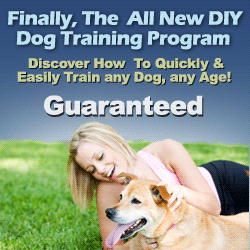


House training is a common concern for new puppy and dog owners. House training requires a lot of patience, commitment and consistency on the owner’s part. It is your job to set your dog up to succeed in eliminating in the right place each time he needs to go. The more consistent you are, the faster your pup will house train. Below, I’ll discuss several steps and guidelines that will help you house train your new pet.
First, establish a consistent routine for sleeping, waking, eating, playing and eliminating. Puppies and new dogs thrive on a regular schedule. It not only helps them to understand what is expected of them – it will also help you anticipate when your dog will need to eliminate. Puppies will need to go out each time they wake up, after they eat and when they are done playing. Additionally, they will need to go out regularly in between these times.
Take your pup out, a lot. On average, a confined pup (crated or tethered) can hold it for about his age in months plus one. That means a two month old pup can hold it for about 3 hours tops – less if he is unconfined. Smaller dogs will also need to go out more frequently. It’s not fair to ask a dog to hold it longer than this.
Take him to the same spot each time you go out. Go with him and take him on leash. Keep this separate from his fun walk or playtime. This will help him focus on going potty. Over time, he will become conditioned to eliminating when you take him to that spot.
Put a cue on eliminating. When you see your pup starting to sniff or circle in anticipation of eliminating, tell him to “Go potty”, “Hurry up” or whatever you want your cue to be. When he finishes eliminating, praise him and reward him with a treat if you want.
In the house, watch your puppy closely for signs that he needs to eliminate – sniffing, restlessness or circling are common signals. Don’t wait for your dog to “ask to go out”, instead try to anticipate him and take him out first. (Dogs that learn to ask to go out to potty will frequently start to ask to go out just because they are bored or want to play. I much prefer to set the schedule.) Also, make it a point to only let a young puppy loose in the house for 20-30 minutes immediately after you know he has eliminated outside.
Develop a consistent method for confining your puppy when you can’t actively watch him. Crate training is excellent for house training but you can also use baby gates to limit the puppy to a small portion of a room or bathroom, or tether him to you or a nearby piece of furniture. The space should be small enough that the pup does not want to eliminate in it but large enough that he can stand up, turn around and lie down comfortably. Any time you release your puppy from his confining area, immediately take him straight out to his potty spot to eliminate.
If you work full-time, it may not be the best time to adopt a young pup. Instead, consider an adult dog that will be better able to hold it through the day. If that isn’t possible, you will need to set your young pup up with a walk in the middle of the day or provide an alternate way to eliminate. Don’t leave your puppy with only the option of soiling in his crate. This will make house training much more difficult.
If there is no way to get your pup outside to potty, I recommend cutting a sod pad, fitting it inside a cut-down box, plastic kiddy pool or dog litter box (available at pet stores). Eliminating on grass in the house is less confusing than eliminating on paper. Paper training is an option but I find that it tends to slow and confuse the house training process. If using a sod box or paper training, make sure that the puppy has enough room to have a bedding area, play area and elimination area.
Feeding consistent amounts of food at regular times will make elimination more regular and easier to anticipate. This means feeding a young pup 3 or 4 meals per day at regular times rather than leaving the food down and letting him graze. I also take food and water away about 3 hours before the puppy’s bedtime to help him sleep through the night without having to pee. If he does need to go out during the night, keep it quiet, short and sweet. Don’t play with or snuggle the puppy, take him out to his spot and put him back to bed so he doesn’t get too excited.
There will be accidents. It’s a normal part of house training. If you catch your puppy in the middle of eliminating in the house, make a noise to startle but not scare him (clap your hands or say, “Ah ah ah”). Immediately take him outside to his spot, praise him and give him a treat if he finishes there. Don’t punish your puppy for going in the house.
Scaring or punishing your puppy will cause more problems than it will fix. If you find an accident, it’s your fault for not watching your puppy. Clean it up thoroughly and use an appropriate enzymatic cleaner to remove all odors from the spot. Don’t use ammonia for cleaning. Put any solid waste in the designated potty spot outside.
Make sure you are appropriately supervising and confining your puppy. If you are having regular accidents in the house, you are giving your puppy too much freedom and need to make sure that he is always supervised or confined until you get it under control. If he has too many accidents, he will get confused and the house training process will take longer.
Common problems:
Some puppies will eliminate in the house right after they have been outside. For many puppies, this is because they are too excited or not comfortable enough outside to eliminate there. In these cases, confine the puppy as soon as you get back in the house. Take him back out to the potty spot 15 minutes later and try again. Repeat the process until he successfully eliminates outside, then give him a short period of supervised play inside.
In some cases, puppies will eliminate in their crates. This frequently occurs when the crate it too big. Usually a smaller crate will solve the problem because puppies naturally don’t want to soil in their sleeping area. Try a smaller crate or a crate with an adjustable divider for a growing pup. Make sure the crate is always large enough for the pup to stand up, turn around and lie down comfortably. Some puppies that were raised in puppy mills or inappropriately confined will learn to soil in their crates. This makes house training more difficult but not impossible. Use alternate forms of confinement, watch closely and make sure to take the puppy out even more frequently and praise and reward profusely.
Adult dogs usually house train much more quickly than puppies. However, dogs coming from outdoor, kennel or shelter environments may need to learn to hold their bladders. For these dogs, follow all the guidelines above but confine for only 2 to 3 hours at a time before gradually increasing.
Finally, if your puppy starts to have accidents after several months of successful house training, you may be giving him too much freedom too quickly. Most puppies are not fully house trained until 7-8 months old. They don’t have accidents if managed correctly but may if not given enough structure. Some small dogs take longer. Remember that the more consistent you are, the quicker the process.
A great resource on housetraining is Patricia McConnell’s pamphlet “Way to Go: How to House Train a Dog of Any Age”. It is available online.

0 komentar:
Posting Komentar